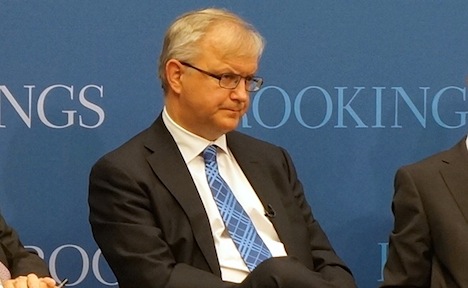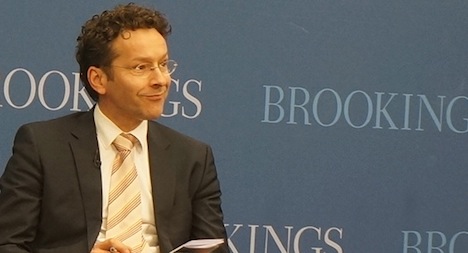If you were at Brookings Thursday afternoon, you could have taken away the following points:![]()
- Olli Rehn (pictured above), European commissioner for economic and monetary affairs and vice president of the European Commission, thinks the eurozone will return to growth by the end of 2013.
- Klaus Regling, chief executive officer of the European Financial Stability Facility thinks there is no north-south divide in the eurozone.
- The three-step plan presented by Jeroen Dijsselbloem, president of the Eurogroup of eurozone finance ministers, for future growth comes down to: balanced budgets, banking union and structural reform. And, by the way, he thinks the main political problem in the eurozone is that European Union leaders have been so busy (for the past four years) dealing with the crisis that they haven’t had time to explain adequately their plans to the public.
Consider this quote from Dijsselbloem (pictured above), whereby he says he and his colleagues have been so busy that they haven’t done a job of explaining themselves to the public:
‘[We’ve been so busy] solving the problems and dealing with the crisis, that we’ve not really involved a lot of people, the public, at large, as to what we’re doing, why we’re doing this, why it’s so crucial to work together along the lines of the strategy, why it’s so crucial to push forward structural reforms,” Dijsselbloem said. ‘People are just experiencing the structural reforms in terms of, ‘I’m losing social rights,’ but we have to explain to them in order for young people to be able to participate also in labor markets, we have to rebalance maybe some countries’ securities and flexibilities in order to create new jobs.’
That’s a fairly audacious understatement of the democratic deficit problem in the European Union these days, and especially among the eurozone member states, who have had treaty upon treaty, condition upon condition dictated to them by Brussels and Berlin.
It also took two questions from the audience about deposit insurance for Dijsselbloem to confirm that their intention is for banking union reform to incorporate a eurozone-wide deposit insurance — in the fullness of time, of course.

Regling (pictured above), one of five northern Europeans sitting on the panel today, went so far as to rebuke Jean Pisani-Ferry, a French economist and director of Bruegel, a Brussels-based think tank, for suggesting that the political risks in the European Union are rising.
The director general of [the European commissioner of economic and monetary affairs] is Italian, I have two deputies, one is French and one is Spanish, so in the end we’re all good Europeans,’ Regling said, after calling Pisani-Ferry’s question cheap. ‘We are also not saying that Southern Europe has no problems — you implied that, I think that’s just wrong. We are fully aware there’s a lot of solidarity coming from European partners to these countries. My institutions alone have dispersed in two years alone €185 billion, in two years alone… That’s a lot of solidarity. These countries go through very painful adjustments, nobody here is denying that, although we’re all northern Europeans. But I don’t like this north-south [dichotomy]. I’ve said this before, Latvia was the first country to take [tough structural adjustments] and that’s pretty northern European, so I think we should all be a bit more rational here.’
Reasonable economists can disagree about the policy mechanisms available to Greece or Italy or Portugal or Spain or Cyprus to pull their economies out of depression and how to repair the eurozone’s growing pains. I’m not going to argue that Italy is in no more dire need of labor market reform than, say Sweden or The Netherlands — of course, Italy needs to modernize its economy if it wants to goose its long-term GDP growth potential. Greeks have had to learn that income tax isn’t an optional exercise. And Germany needs to figure out a viable trade model where the eurozone doesn’t exist, as it seemed in its first decade, as a means of enabling the European periphery to buy all of Germany’s exports.
But to refuse to see that there’s a north-south divide in Europe, that Mediterranean Europe is not at the center of today’s eurozone crisis, is abjectly short-sighted. Regling has to realize that even the north-south divide in Germany is stronger than the east-west divide, despite the separation of west from east for nearly three decades!
It’s Italy that’s currently undergoing a crisis of government today, not France. It’s Golden Dawn in Greece winning their highest percentage of votes in the history of post-dictatorship Greece, it’s not a neo-Nazi resurgence in Germany. It’s Cypriot depositors who spent a week wondering if their five-figure savings would be taxed by 6.75%, not the Irish or the Latvians. That’s not to deny that Latvia and Estonia and Ireland have made incredibly tough decisions in the past four years, but none of those economies are even as big as Greece, let alone Spain or Italy.
If eurocrats like Regling have such a hard time at Brookings, who are largely sympathetic to the goal of (if not always the precise strategies for) saving the eurozone, good luck dealing with Alexis Tsipras’s radical left Greek government or the next Silvio Berlusconi government in Italy or Artur Mas’s declaration of Catalan independence — all of which could happen by the end of 2014.
Photo credit to Kevin Lees — Brookings Institution, Washington DC, April 2013.

